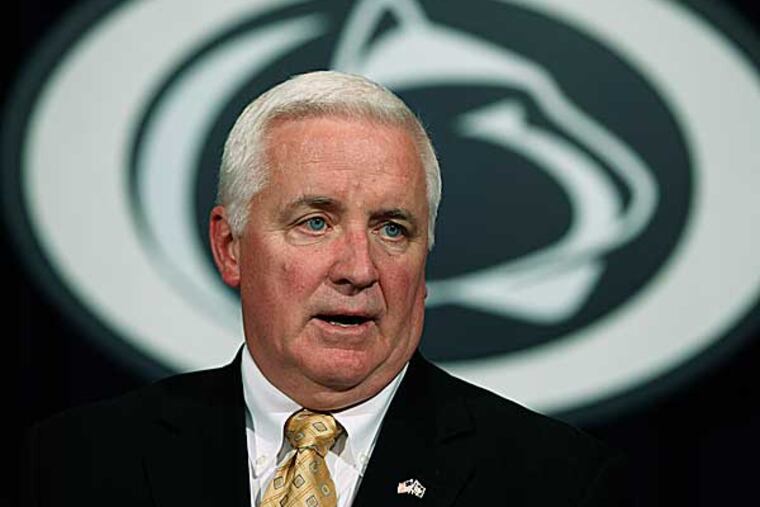Corbett says he changed positions on NCAA after learning facts
Gov. Corbett said Thursday that his thinking evolved over time regarding a series of NCAA-imposed sanctions against Pennsylvania State University and that he decided in late October that he would sue the organization.

Gov. Corbett said Thursday that his thinking evolved over time regarding a series of NCAA-imposed sanctions against Pennsylvania State University and that he decided in late October that he would sue the organization.
His remarks, in a series of television and radio interviews, came a day after his office filed an unprecedented federal antitrust lawsuit seeking to overturn those punishments by college sports' governing body and months after he urged Penn State to "accept the serious penalties" without argument.
But while Corbett worked to explain this apparent contradiction, critics continued to question the timing of his legal challenge, its potential political implications, and even the law firm hired to wage the battle in court.
"I did not have all the facts in front of me," Corbett said in a Thursday morning interview with KDKA radio in Pittsburgh. "I did not know the NCAA was not following their own rules."
Bruce L. Castor Jr., a Montgomery County Republican and potential 2014 primary challenger to Corbett, was critical of the turnaround.
The lawsuit "smacks of political gamesmanship and too little, too late," he said in a statement Thursday. The governor's "sudden reversal, and the decision to spend substantial taxpayer money on a federal lawsuit, now raises more questions than it answers."
Corbett's lawsuit asks a federal judge to throw out the NCAA sanctions, which included a $60 million fine, a four-year postseason ban, and the voiding of 14 years of wins for Penn State's football team.
The petition argues that the association "cynically and hypocritically exploited the tragedy" surrounding the arrest of Jerry Sandusky to "gain leverage in the court of public opinion" and "boost the reputation and power of the NCAA's president."
Sandusky, a former assistant football coach, is serving a 30-year sentence for molesting 10 boys. Three former Penn State administrators await trial on charges that they covered up allegations of abuse for years.
The NCAA has repeatedly defended the sanctions as appropriate given the unusual and extreme nature of the infractions. The organization dismissed Corbett's lawsuit as meritless Wednesday and described it as an affront to Sandusky's victims.
Sources familiar with early discussions about the NCAA lawsuit acknowledged Thursday that political ramifications were considered but were not the driving factor behind the decision to sue.
Since launching the Sandusky investigation as attorney general, Corbett has become a frequent punching bag for disaffected Penn State fans unhappy with his early handling of the case, his role as a member of the university's board of trustees, and his initial reaction to the NCAA penalties.
"No matter what his motives are with the lawsuit, the practical aspect is, it has political ramifications for the governor," said Chris Borick, a political scientist at Muhlenberg College. "It's clear the Sandusky issue has become more of a liability than an asset for him. It looks like he's trying to change that."
In his interview with KDKA, Corbett said he initially supported Penn State's decision to accept the NCAA punishment package. But, he maintained, he changed his mind after learning that the association's top officials had not followed their normal process for reviewing and punishing university misconduct.
"My thought process at the time was, well, if you belong to an association, you have to play by the rules of the association," Corbett said. "We looked at the rules of the association, and we think that the association didn't play by the rules."
Castor and other critics Thursday questioned whether the governor was also bending rules to his advantage by excluding incoming Democratic Attorney General Kathleen Kane from the lawsuit's process.
Kane, who is to take office Jan. 15, channeled outrage among Penn State fans as part of her election bid this fall, running largely on a promise to investigate Corbett's handling of the Sandusky case.
Corbett's general counsel, Jim Schultz, said Wednesday that Kane was not consulted before the lawsuit was filed or before current Attorney General Linda Kelly decided in December to hand over the case to the governor's office.
Kelly, a Corbett appointee, told the Associated Press on Thursday that she thought the ongoing criminal cases involving Penn State administrators could pose a conflict of interest and demand too much staff time to effectively pursue a suit against the NCAA.
State law grants the attorney general authority to delegate power to pursue and defend lawsuits involving state agencies as well as to hire outside counsel to handle a case.
Schultz, the governor's top lawyer, said Wednesday that his own former law firm, Cozen O'Connor, will handle the case for Corbett's office.
The firm is a frequent donor to both Democrats and Republicans. Cozen attorneys, family members, and the firm's political action committee donated $97,640 to Corbett's 2010 gubernatorial election bid, according to campaign finance records.
Defending the choice Thursday, the governor lauded the firm's expertise in antitrust work and said he "wanted experts in the field."